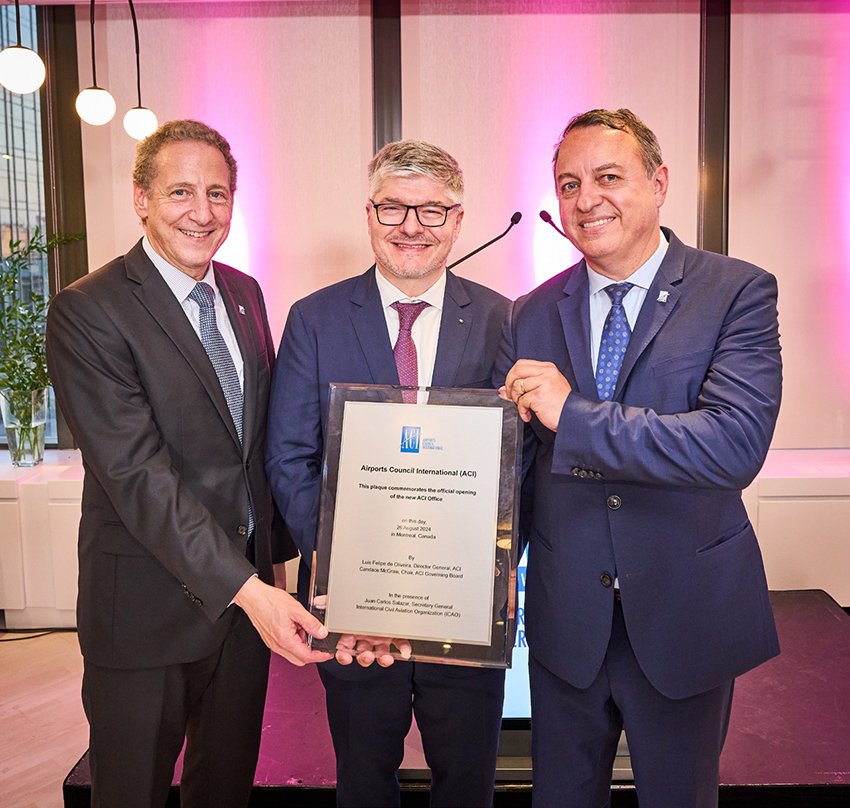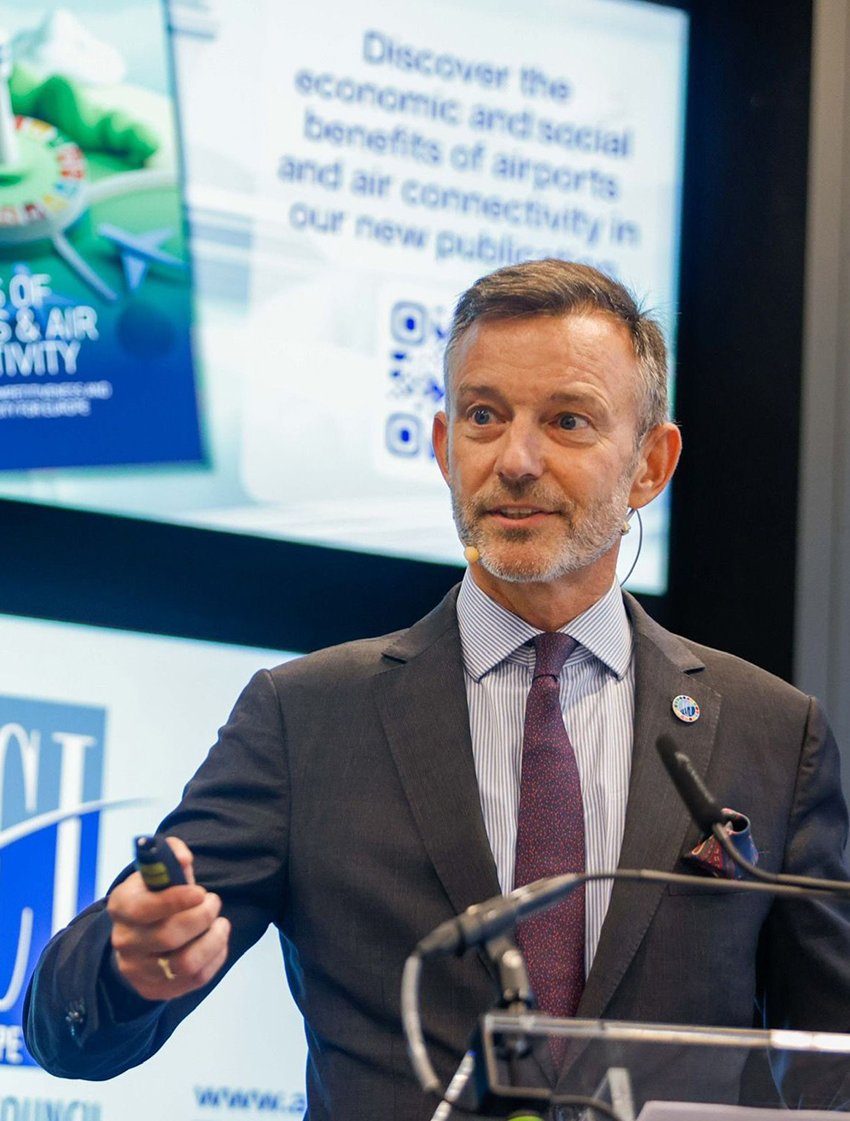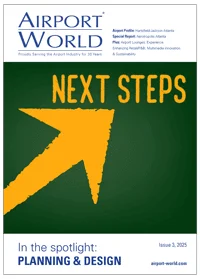World in motion – ACI News
Share

We report on the latest news, views and developments from ACI World and across the organisation’s five regions.
ACI World projects healthy global passenger traffic in 2024
ACI World’s highly anticipated 2024 Annual World Airport Traffic Report is projecting a 10% growth in global passenger traffic in 2024, reaching 9.5 billion by year-end.
Drawing data from over 2,700 airports across more than 180 countries and territories, the report offers the most comprehensive overview of the global airport industry and aviation markets for the operating year 2023 and the first half of 2024.
ACI World director general, Justin Erbacci, commented: “The release of the 2024 Annual World Airport Traffic Report highlights the resilience and adaptability of the global aviation industry and demonstrates ACI World’s unmatched ability to predict and analyse industry trends.
“The insights provided in this report – reaffirming ACI World’s 99.99% forecasting accuracy – are crucial for aviation stakeholders, policymakers, and industry professionals to make informed, data-driven decisions and strategically plan for the future.”
• H1 2024 passenger traffic: By June 2024 year-to-date (YTD), total passenger traffic increased by 11% YoY, reaching 102% of the June 2019 YTD level. The international market, driving recovery, saw a 17% YoY increase, while the domestic market grew by 6% YoY.
• 2024 international passenger traffic: Expected to reach 4.1 billion by the end of 2024, accounting for 43% of total passengers.
• 2024 domestic passenger traffic: Projected to reach 5.4 billion by the end of 2024, making up 57% of the total.
Despite positive macroeconomic developments such as easing inflationary pressures, ACI World notes that the medium-to-long-term outlook remains subject to downside risks such as geopolitical conflicts, labour market bottlenecks, and aircraft delivery constraints.
However, the gradual recovery of international passengers and a return to profitability for airlines signal a positive momentum in the industry.

ACI World celebrates opening of new Montreal office
ACI World director general, Justin Erbacci, was among a host of guests that included ACI World chair and CEO of Cincinnati/Northern Kentucky International Airport, Candace McGraw, and ICAO secretary general, Juan Carlos Salazar, at the opening of ACI World’s new Montreal offices in early September.
Immediate past ACI World director general, Luis Felipe de Oliveira, said: “This new space is not just an office; it is a hub for big ideas and forward-thinking. Here, we will envision and shape the future of airports and the aviation industry.”
He also took the opportunity to honour the 80th Anniversary of the Chicago Convention and ICAO’s crucial role in fostering international civil aviation over the past eight decades.
Also joining in the celebrations were Luc Rabouin, Ville de Montréal’s executive committee chair, responsible for finance, economic development, and higher education.

New guide to enhance accessible travel
ACI World has launched an essential publication dedicated to improving accessible travel for all passengers.
The publication, Airports and Accessible Travel: A Practical Guide, was launched during the Airports Service Quality (ASQ) Forum at the ACI Customer Experience Global Summit in Atlanta, an event dedicated to customer and employee experiences at airports.
The guide was developed by the ACI World Facilitation and Services Standing Committee in collaboration with leading accessibility advocacy groups, ACI World training partners, ACI Regions, ACI airport members and Customer Centric Consulting, with the financial support of InterVISTAS Consulting and Amadeus.
Building on ACI World’s Airports & Persons with Disabilities Handbook, the expanded guidance provides up-to-date best practices for integrating accessibility into both new and existing airport facilities.
It includes practical recommendations, case studies, and strategies for barrier-free design, accessible procedures, and services for passengers with visible and non-visible disabilities, while also focusing on staff training.
ACI World director general, Justin Erbacci, said: “Approximately 1.3 billion people, or one in six globally, experience some form of disability [WHO data]. ACI World is dedicated to assisting our member airports in creating barrier-free environments, ensuring equal access and exceptional travel experiences for all airport guests, regardless of ability.
“We remain committed to advocating for and developing resources to support our members in providing a more inclusive and accessible air transport system.”
To further support its global members, ACI also developed the Accessibility Enhancement Accreditation (AEA) programme, which is designed to provide a continuous improvement path for airports regarding accessibility for passengers with disabilities.
The programme helps airports measure, evaluate, and enhance their accessibility management and culture through tailored advice from subject matter experts and learning experiences with peers.
It remains the only international assessment and accreditation programme dedicated to airport accessibility for passengers with disabilities.
The first certificate ceremony of the programme was held during the ASQ Forum, marking the AEA programme’s second anniversary.
To date, over 50 airports have joined the initiative, underscoring airports’ dedication to building a more accessible and inclusive air transport system.

ACI-LAC and IATA host Aviation Day
ACI Latin America & Caribbean (ACI-LAC) and IATA are hailing the success of Aviation Day Argentina in Buenos Aires, which brought together more than 450 delegates from across the aviation industry in early September.
The meeting provided a forum to discuss the opportunities and challenges ahead for Argentina, particularly since the introduction of new government policies setting the framework for the opening and deregulation of the aviation market.
Many participants highlighted the importance of Public-Private Partnerships as these can support aviation’s role as a strategic economic partner, not only facilitating social connectivity, but also driving the development of tourism, trade and investment, even in a challenging economic context.
As IATA’s regional vice president for the Americas, Peter Cerdá, stated in his opening remarks, “when the industry works together, and when governments provide the framework for a thriving industry, the economic benefits are felt by all.”
ACI-LAC’s director general, Rafael Echevarne, echoed these sentiments, stating that the Argentinian government’s measures of openness and deregulation will result in benefits for all passengers.
Argentina’s Secretary of Transportation, Franco Mogetta, told delegates that the desire of the current administration is to “let the private sector do what they know best”, a policy which would result in less interference from the state in how airports operate and facilitate procedures.

Successful annual conference for ACI Africa
The 33rd ACI Africa Annual General Assembly, Regional Conference, Exhibition & Airshow recently took place at the ACSA International Indaba Centre in Johannesburg.
More than 75 airport members representing 265 airports across 54 African countries attended the event, which had the theme of ‘Flying Together: Airport Collaboration and Partnerships’.
Participants included Mpumi Mpofu, CEO of Airports Company South Africa (ACSA); Ali Tounsi, secretary general of ACI Africa; Justin Erbacci, director general of ACI World; Emanuel Chaves, ACI Africa president; and Nkosindiphile Xhakaza, Mayor of Ekurhuleni.
James Mlawu, South Africa’s Director-General of Transport, representing the Minister of Transport, underscored the importance of collaboration between government and industry stakeholders in advancing aviation across Africa.
As always, the conference addressed critical topics in airport management, including technology innovation, safety, environmental sustainability, and regulatory models.
Notable workshops included discussions on airport growth strategies led by Lufthansa Consulting; operational efficiency through technology, (SITA); sustainability and wildlife conservation (WWF); and workforce development (Strikitsa Consulting).
Participants also engaged in a hands-on session on Rescue and Firefighting Practices at OR Tambo International Airport, hosted by Airports Company South Africa.
ACI Africa notes that the event provided a vital platform for aviation professionals to exchange knowledge, build partnerships, and explore solutions that will shape the future of African air travel.

New study shows value of air connectivity
ACI EUROPE has released a new study The Economic and Social Impact of European Airports & Air Connectivity.
The study, conducted by SEO Amsterdam Economics, independently documents the contribution of the airport industry to the European economy. It also, for the first time, quantifies its positive relationship with a diverse range of societal benefits enshrined in the United Nations Sustainable Development Goals.
The SEO Amsterdam Economics study reveals that:
• Europe’s airports and the air connectivity they enable generate 14 million jobs and €851 billion in GDP (5% of entire European GDP) each year.
• Every 10% increase in direct air connectivity yields a 0.5% increase in GDP per capita and 1.6% increase in jobs.
ACI EUROPE’s director general, Olivier Jankovec, commented: “The extensive analysis and data clearly show that what sets airports and the aviation ecosystem apart from most other sectors is their ability to facilitate and support wider economic activities.
“This results in increased trade and productivity, along with greater investments, tourism activity and increased employment rates overall. This specific ability clearly boosts overall national and European economic performance — and only means one thing: that airports and air connectivity are irreplaceable drivers of competitiveness for Europe.”
The report was unveiled at ACI EUROPE’s Airport Economics Symposium in Brussels in October.
Delivering the keynote speech at the event, Enrico Letta, president of the Jacques Delors Institute and former Prime Minister of Italy, said: “Air connectivity is one of the fundamental pillars of European integration and cohesion, and indeed the future of our EU Single Market depends very much on the resilience and effective decarbonisation of our transport systems.
“By highlighting the far reaching benefits linked to our airport infrastructure, the study released today by ACI EUROPE tells us we need more than just to safeguard our Single Aviation Market, but also to make sure it supports and enables our green growth trajectory”.

Airport Carbon Accreditation milestone for ACI-NA
ACI-NA has celebrated its 10th year of participation in the Airport Carbon Accreditation programme, with nearly 90 North American airports to date gaining various levels of accreditation in the initiative designed to mitigate aviation’s impact on the environment.
“Airport sustainability is more important than ever as we work to reduce our environmental impact while still maintaining exceptional service and operations,” said ACI-NA president and CEO, Kevin Burke.
“Now celebrating 10 years of action in reducing the airport industry’s carbon footprint, we are delighted to recognise the hard work of nearly 90 North American airports that have joined, renewed, or upgraded their Airport Carbon Accreditation this year.
“Their efforts help set our industry on a path towards further sustainability and to eventually achieve our goal of carbon neutral.”
Today, more than 60% of the travelling public in North America travel through an accredited airport.
ACI Asia-Pacific & Middle East stresses importance of economic sustainability and financial resilience for infrastructure development
At the 59th Conference of Directors General of Civil Aviation, Asia and Pacific Region in Cebu, Philippines, ACI Asia-Pacific & Middle East stressed that economic sustainability and financial resilience will be critical components for the capacity enhancing infrastructure needed across the region in the coming decades.
With Asia-Pacific set to handle 40% of global passengers by 2042, an estimated $1.3 trillion in investment is needed to ensure that the region’s airports are capable of meeting the huge rise in demand over the coming decades.
ACI Asia-Pacific & Middle East’s director general, Stefano Baronci, said: “With the Asia-Pacific region driving the global growth in air travel, investing in modern, efficient, and sustainable airport infrastructure is no longer an option – it has become a necessity.
“As airports continue to play a crucial role in the socio-economic development of their regions, they must be equipped to meet growing demand while maintaining financial viability for decades to come.
“At the same time, as the industry evolves, we must also prioritise enhanced safety, explore innovative ways to strengthen aviation security, promote diversity, and inclusion, and greater sharper focus on environmental sustainability.”
ACI Asia-Pacific & Middle East notes that it was encouraging to see the conference urge states to support airport operations and infrastructure investment.
In addition, ICAO called for States to engage in ACI’s Net Zero Roadmap programme for sustainable airports and adopt safety culture indicators to strengthen safety assessments.







